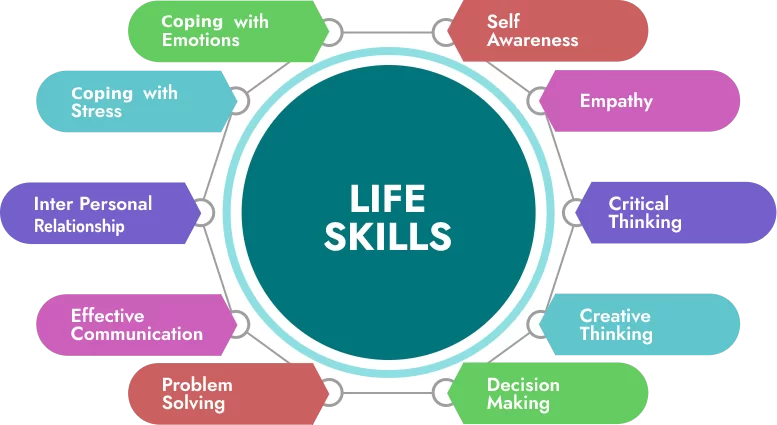The Importance of Life Skills: Building a Foundation for Success

Life skills are essential abilities that help individuals navigate the challenges of everyday life with confidence and ease. From managing emotions to making smart decisions, these skills go far beyond academic knowledge. They play a crucial role in personal development, relationships, and future career success. Whether you’re a student, professional, or parent, understanding and practicing life skills can make all the difference in creating a fulfilling life.
In this article, we’ll explore the different types of life skills, their benefits, and practical ways to incorporate them into daily routines. Let’s dive in!
What Are Life Skills?

At their core, life skills are practical tools for managing various aspects of life effectively. They cover a range of competencies, such as communication, problem-solving, self-awareness, and financial literacy. These skills aren’t just taught in schools—they’re learned through experiences and shaped by individual journeys.
Life skills prepare people to face everyday challenges and unexpected situations. They improve emotional intelligence, decision-making abilities, and the capacity to adapt to change. In short, life skills are the building blocks of independence and personal growth.
Why Life Skills Matter in Today’s World
In a fast-changing world, having solid life skills is more important than ever. Whether it’s dealing with stress, managing money, or working in a team, individuals with well-developed life skills are better equipped to thrive. Here’s why life skills are essential:
- Adaptability: They help you adjust to changing environments, whether in personal relationships or the workplace.
- Mental Health Support: Knowing how to handle emotions and stress can promote mental well-being.
- Improved Decision-Making: Life skills enable you to weigh options and make informed choices.
- Better Social Connections: Effective communication and empathy enhance relationships.
Types of Life Skills Everyone Needs
Different life skills serve unique purposes, but all are interconnected. Below are some key categories of life skills and how they contribute to overall success.
Communication Skills
Good communication isn’t just about talking—it’s also about listening, understanding, and expressing thoughts clearly. Strong communication skills allow people to connect meaningfully with others.
- Active listening
- Non-verbal communication (body language)
- Conflict resolution
- Public speaking and presentation skills
Emotional Intelligence
Managing emotions and understanding others’ feelings is critical in building healthy relationships. Emotional intelligence (EQ) helps people stay calm under pressure and respond thoughtfully in tough situations.
- Self-awareness
- Empathy
- Stress management
- Emotional regulation
Critical Thinking and Problem-Solving
The ability to think critically and solve problems is vital for both personal and professional success. Critical thinking encourages people to question assumptions, analyze information, and develop creative solutions.
- Analyzing risks and benefits
- Decision-making strategies
- Creative thinking
- Logical reasoning
Financial Literacy
Understanding how to manage money is one of the most important life skills for achieving financial independence. It includes budgeting, saving, investing, and avoiding debt.
- Creating a budget
- Setting financial goals
- Understanding loans and credit
- Planning for emergencies
Time Management
Good time management ensures productivity and helps prevent burnout. Knowing how to prioritize tasks is essential for maintaining a healthy balance between work, school, and leisure.
- Setting priorities
- Avoiding procrastination
- Creating schedules and routines
- Tracking progress
Social Skills and Teamwork
In today’s interconnected world, collaboration is key. Social skills allow people to work effectively with others, whether on group projects or in professional teams.
- Building trust
- Respecting diversity
- Delegating tasks
- Managing group dynamics
Coping with Stress and Anxiety
Life can be overwhelming at times, making it necessary to develop ways to manage stress and anxiety. These skills ensure that setbacks don’t derail progress and happiness.
- Breathing exercises and meditation
- Identifying triggers
- Practicing mindfulness
- Seeking support when needed
Table: Essential Life Skills at a Glance
CategoryKey Skills
Communication Active listening, conflict resolution, public speaking
Emotional Intelligence Self-awareness, empathy, stress management
Critical Thinking Analyzing risks, decision-making, creative thinking
Financial Literacy Budgeting, saving, understanding credit
Time Management Prioritizing tasks, avoiding procrastination
Social Skills Teamwork, managing group dynamics, collaboration
Coping with Stress Mindfulness, identifying triggers, relaxation techniques
How to Develop Life Skills
Now that we know what life skills are, the next step is learning how to develop them. Fortunately, these skills can be improved with consistent practice and self-reflection. Here are a few practical tips:
- Practice Self-Awareness: Keep a journal to track your emotions and behaviors throughout the day.
- Join Clubs or Groups: Social activities provide great opportunities to enhance teamwork and communication skills.
- Use Time Wisely: Try using planners or digital tools to organize your day and stay on top of tasks.
- Learn Financial Management: Start by setting small savings goals and gradually work towards larger financial objectives.
Teaching Life Skills to Children and Teens
Teaching life skills to children and teens lays the foundation for their future independence. Schools, parents, and communities play a big role in this process. Here are some strategies for teaching life skills to young people:
- Chores and Responsibilities: Assign tasks like cooking, cleaning, or budgeting allowances.
- Encourage Critical Thinking: Ask open-ended questions to help them analyze problems and solutions.
- Model Healthy Behavior: Children learn by watching adults—be a good role model in areas like stress management and communication.
Life Skills in the Workplace
Life skills aren’t just useful in personal life—they’re essential in the workplace, too. Employers increasingly look for candidates with strong interpersonal skills, emotional intelligence, and time management abilities. Employees with well-developed life skills tend to perform better, adapt more easily, and work well with others.
Some life skills that stand out in a professional setting include:
- Effective communication in meetings and emails
- Handling workplace stress and tight deadlines
- Collaborating on group projects
- Resolving conflicts among team members
Why Life Skills Are a Lifelong Journey
Mastering life skills isn’t a one-time task—it’s an ongoing process. As life changes, new challenges arise, requiring the constant development of these abilities. The beauty of life skills lies in their adaptability. What works for a teenager may evolve for an adult facing different situations, such as parenting or managing a career.
Continual learning and self-improvement help individuals remain resilient and successful throughout life. It’s never too late to develop or refine life skills—each new experience offers a chance to grow.
Conclusion: Embrace Life Skills for a Brighter Future
Having strong life skills gives you the tools to succeed, no matter where life takes you. These abilities enhance emotional well-being, strengthen relationships, improve productivity, and prepare you for the challenges ahead. Whether you’re teaching these skills to children, honing them yourself, or applying them at work, they’re essential for personal and professional growth.
Start building your life skills today, and you’ll find yourself more equipped to handle whatever life throws your way. Remember, the journey of learning never ends, and every step forward brings new opportunities to grow. So, what are you waiting for?





